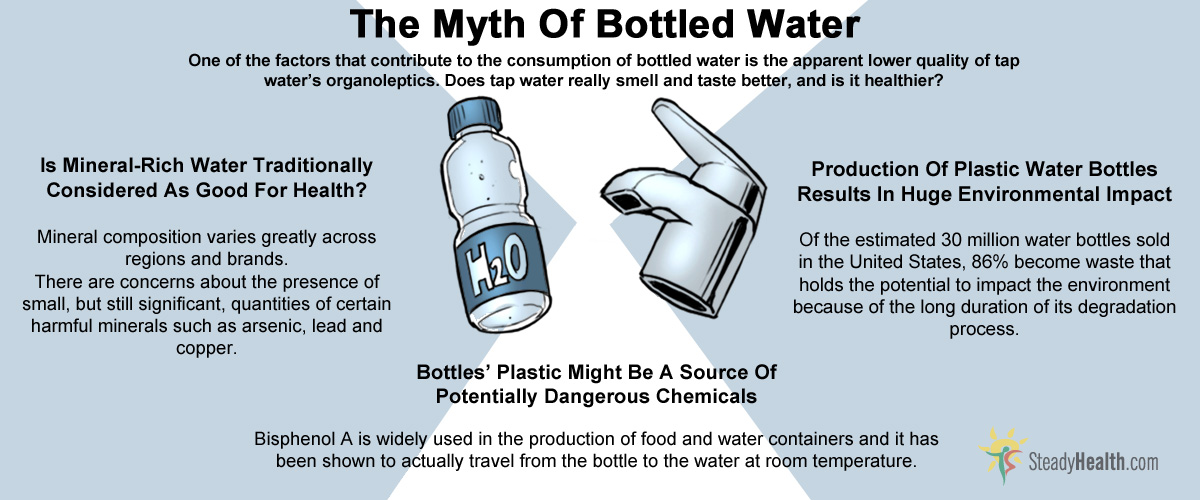Table of Contents
Regardless of the route drinking water follows to get to people’s houses, the fact is that safe drinking water is essential in everyone’s daily lives — for drinking, cooking, and washing food. For some people, tap water fits their needs perfectly. For others, water that comes packaged in a bottle represents the best solution. In fact, bottled water sales have increased significantly in the past few years. Americans spend billions of dollars per year on water bottles, making this type of water the fastest growing drink of choice in the U.S.A. Retail bottled water, the one people generally have access to and consume, accounts for 80% of the bottled water market and it is also its fastest growing segment of the market. Bottled water consumers ingest an average of 736 mL per day.
Why is bottled water so popular?
One of the factors that contribute to the consumption of bottled water is the apparent lower quality of tap water’s organoleptics, that is, the smell, taste and color of tap water.
Indeed, much of the popularity of bottled water arises from the belief that tap water possesses a characteristic and less desirable taste that bottled water options do not have. However, there is no robust scientific evidence that actually supports the alleged superior taste of bottled water, which is produced at varying levels of the quality spectrum and certainly is not all spring water. Because tap water supplies vary greatly all over the world, it is nearly impossible to obtain consensus regarding this topic, but many people believe that if tap water does have some particular taste, that is due to the presence of chlorine, a safe disinfection substance used by most tap water suppliers that does impact the taste.
Bottled water suppliers prefer more complex disinfection methods, such as ozone or UV light, thus avoiding the traditional "tap water taste". According to the US Environmental Protection Agency, it is important to note that bad taste does not necessarily mean bad water. Likewise, a lack of odor or color does not mean the water is safe, as bacteria and chemicals can be odorless and tasteless but still dangerous. This is an interesting point to enlighten, as it has been examined that organoleptics influence people’s perception of what is safe and healthy. But, for example, the presence of certain microorganisms typically does not alter water’s taste and it still makes it dangerous.
Read More: What Plain Old Water Can Do For Your Health
Other reasons behind the high consumption of bottled water in the U.S. include the perceived health benefits of drinking such water versus tap water. Although consumers don’t necessarily see tap water as unsafe, they consider bottled water to have a better effect on their health. In a study conducted at the University of Birmingham, UK, it was found that most people believed bottled water to provide them with additional health benefits when compared to tap water, although the majority of them acknowledge these benefits to be negligible.
- EPA 2005. Bottled Water Basics
- NAPIER, G. L. & KODNER, C. M. 2008. Health risks and benefits of bottled water. Primary Care: Clinics in Office Practice, 35, 789-802
- GOLDSTEIN, S. T., JURANEK, D. D., RAVENHOLT, O., HIGHTOWER, W., MARTIN, D. G., MESNIK, J. L., GRIFFITHS, S. D., BRYANT, A. J., REICH, R. R. & HERWALDT, B. L. 1996. Cryptosporidiosis: an outbreak associated with drinking water despite state-of-the-art water treatment. Annals of Internal Medicine, 124, 459-468
- DORIA, M. F. 2006. Bottled water versus tap water: understanding consumers' preferences. Journal of Water and Health, 4, 271-276
- WARD, L. A., CAIN, O. L., MULLALLY, R. A., HOLLIDAY, K. S., WERNHAM, A. G., BAILLIE, P. D. & GREENFIELD, S. M. 2009. Health beliefs about bottled water: a qualitative study. BMC Public Health, 9
- Mindmap by steadyhealth.com
- Photo courtesy of Todd Morris by Flickr : www.flickr.com/photos/alohateam/4300305642/
- www.bottledwater.org/economics/bottled-water-industry
- www.sciencedirect.com/science/article/pii/S0095454308000481
- annals.org/article.aspx?articleid=709491
- www.iwaponline.com/jwh/004/0271/0040271.pdf
- www.biomedcentral.com/1471-2458/9/196
- www.pacinst.org/publication/bottled-water-and-energy-a-fact-sheet/
- www.huffingtonpost.com/norm-schriever/post_5218_b_3613577.html



Your thoughts on this